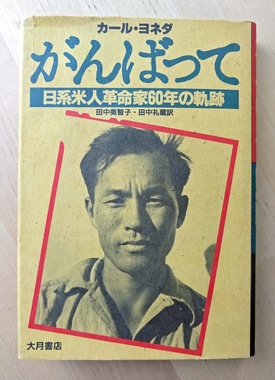A life of fighting for conviction
For second and third generation Japanese Americans, the word "ganbatte" (do your best) is one of the most memorable Japanese words that express the Japanese spirit. Carl Yoneda (1906-1999), author of "Ganbatte: The 60-Year Journey of a Japanese American Revolutionary," was a man who, based on his own beliefs, continued to work hard throughout his life with strong will.
In "Ganbatte," he looks back on his life, which can be considered a history of struggle, as he confronted society head-on and lived a powerful life during the tumultuous times that followed the war. Although originally written in English, it was translated by Michiko Tanaka and Reizo Tanaka and published by Otsuki Shoten in 1984.
Let's take a quick look back at his life. Karl Yoneda was born in Los Angeles in 1906 as the second generation of immigrants from Hiroshima Prefecture. He was originally named Gozo, but later took on the name Karl after his respected friend Karl Marx.
In 1913, he went to Hiroshima to receive an education as a Japanese person. He lived with his family in Japan and received a Japanese education, but at the age of 15, he took a strong interest in the issues of the socially disadvantaged and workers, and even participated in a strike by newspaper delivery boys.
He also read extensively the writings of socialists and anarchists, both in Japan and abroad, and in his teens, he went to meet one of them, the Russian anarchist Eroshenko, in Beijing, where Eroshenko was staying. In 1926, he returned to the United States on his own to avoid military service in Japan.
He continued his involvement in the labor movement with Japanese activists and Americans, and at the same time joined the Communist Party of America. He edited the party's journal, participated in various strikes, and worked on racial discrimination, anti-war and peace, and poverty and unemployment issues. He also worked as a "docker" (a longshoreman) for many years.
As this was a pre-war movement, he was persecuted by management and the police, and was injured many times. He was arrested and put on trial, and suffered racial discrimination. Nevertheless, he continued his activities without giving up. During this time, he married a Jewish woman named Elaine, whom he met as a fellow activist, and had a child with her.
Attacked by both Japanese and Americans
As the times headed towards war, he showed a willingness to fight against fascism in Japan, Germany and other countries, and expressed a desire to serve in the US military. However, because he was of Japanese descent, he was sent to an internment camp (Manzanar) like other Japanese people. There, he was attacked by Japanese people who had returned to the US, calling him an "FBI dog". He eventually joined the Army Intelligence Service and was sent to the battlefield, where he used his Japanese language skills to urge Japanese soldiers to surrender.
After the war, he continued to work as a port worker, but due to poor health he also worked at a chicken farm for a time. He then returned to port work, joined the International Port Workers and Warehousemen Union, and continued to devote himself to the labor movement and the civil rights movement. In the era of fierce anti-communism and the Red Scare, he was oppressed, but he did not give in and did not change his stance.
When the Vietnam War began, he joined the anti-war and peace movement, and was active in the movement for compensation for the wartime internment of Japanese Americans and in improving the status of immigrants. During this time, he also attended the World Conference Against Atomic and Hydrogen Bombs in Japan and the World Peace Conference in Moscow. Although he could not tolerate Japanese militarism and fascism, he also stood up against American imperialism and racism.
Yoneda passed away in 1999, but "Ganbatte" covers events up until 1982. This book goes into great detail about the labor movement and other social activities he was involved in, and is of unparalleled value as a record of the activities of Okinaka Nakaji, a second-generation Japanese-American who belonged to the Communist Party of America. At the same time, it is also a drama depicting the life of a man whose ideas and beliefs never change, no matter how the country or society changes, and who therefore always had to face headwinds.
"Growing up," he wrote, "I was never physically strong, but I was as tenacious and stubborn as a mule. I never gave in to disease or the adversity that befell me."
Although he is a man of steel, he is always thinking of his mother, whom he left behind in Japan. His mother must have had a hard time living in the country because her son had gone to America to avoid military service and was a member of the Communist Party. However, she understood her son and always encouraged him.
Although Yoneda feels that this is unfilial, he cannot change his way of life. Understanding her son's nature, his mother simply watches him from afar. The relationship between mother and son, who care for each other, is warm and tender.
(Titles omitted)
© 2017 Ryusuke Kawai







